- Home
- P. G. Wodehouse
A Damsel in Distress Page 2
A Damsel in Distress Read online
Page 2
CHAPTER 2.
The sun that had shone so brightly on Belpher Castle at noon, whenMaud and Reggie Byng set out on their journey, shone on theWest-End of London with equal pleasantness at two o'clock. InLittle Gooch Street all the children of all the small shopkeeperswho support life in that backwater by selling each other vegetablesand singing canaries were out and about playing curious games oftheir own invention. Cats washed themselves on doorsteps,preparatory to looking in for lunch at one of the numerous garbagecans which dotted the sidewalk. Waiters peered austerely from thewindows of the two Italian restaurants which carry on the LucretiaBorgia tradition by means of one shilling and sixpenny _table d'hote_luncheons. The proprietor of the grocery store on the corner wasbidding a silent farewell to a tomato which even he, though adauntless optimist, had been compelled to recognize as havingoutlived its utility. On all these things the sun shone with agenial smile. Round the corner, in Shaftesbury Avenue, an east windwas doing its best to pierce the hardened hides of the citizenry;but it did not penetrate into Little Gooch Street, which, facingsouth and being narrow and sheltered, was enabled practically tobask.
Mac, the stout guardian of the stage door of the Regal Theatre,whose gilded front entrance is on the Avenue, emerged from thelittle glass case in which the management kept him, and came out toobserve life and its phenomena with an indulgent eye. Mac wasfeeling happy this morning. His job was a permanent one, notinfluenced by the success or failure of the productions whichfollowed one another at the theatre throughout the year; but hefelt, nevertheless, a sort of proprietary interest in theseventures, and was pleased when they secured the approval of thepublic. Last night's opening, a musical piece by an Americanauthor and composer, had undoubtedly made a big hit, and Mac wasglad, because he liked what he had seen of the company, and, in thebrief time in which he had known him, had come to entertain a warmregard for George Bevan, the composer, who had travelled over fromNew York to help with the London production.
George Bevan turned the corner now, walking slowly, and, it seemedto Mac, gloomily towards the stage door. He was a young man ofabout twenty-seven, tall and well knit, with an agreeable,clean-cut face, of which a pair of good and honest eyes were themost noticeable feature. His sensitive mouth was drawn down alittle at the corners, and he looked tired.
"Morning, Mac."
"Good morning, sir."
"Anything for me?"
"Yes, sir. Some telegrams. I'll get 'em. Oh, I'll _get_ 'em," saidMac, as if reassuring some doubting friend and supporter as to hisability to carry through a labour of Hercules.
He disappeared into his glass case. George Bevan remained outsidein the street surveying the frisking children with a sombre glance.They seemed to him very noisy, very dirty and very young.Disgustingly young. Theirs was joyous, exuberant youth which made afellow feel at least sixty. Something was wrong with George today,for normally he was fond of children. Indeed, normally he was fondof most things. He was a good-natured and cheerful young man, wholiked life and the great majority of those who lived itcontemporaneously with himself. He had no enemies and manyfriends.
But today he had noticed from the moment he had got out of bed thatsomething was amiss with the world. Either he was in the grip ofsome divine discontent due to the highly developed condition of hissoul, or else he had a grouch. One of the two. Or it might havebeen the reaction from the emotions of the previous night. On themorning after an opening your sensitive artist is always apt tofeel as if he had been dried over a barrel.
Besides, last night there had been a supper party after theperformance at the flat which the comedian of the troupe had rentedin Jermyn Street, a forced, rowdy supper party where a number oftired people with over-strained nerves had seemed to feel it a dutyto be artificially vivacious. It had lasted till four o'clock whenthe morning papers with the notices arrived, and George had not gotto bed till four-thirty. These things colour the mental outlook.
Mac reappeared.
"Here you are, sir."
"Thanks."
George put the telegrams in his pocket. A cat, on its way back fromlunch, paused beside him in order to use his leg as a serviette.George tickled it under the ear abstractedly. He was alwayscourteous to cats, but today he went through the movementsperfunctorily and without enthusiasm.
The cat moved on. Mac became conversational.
"They tell me the piece was a hit last night, sir."
"It seemed to go very well."
"My Missus saw it from the gallery, and all the first-nighters wasspeaking very 'ighly of it. There's a regular click, you know, sir,over here in London, that goes to all the first nights in thegallery. 'Ighly critical they are always. Specially if it's anAmerican piece like this one. If they don't like it, they precioussoon let you know. My missus ses they was all speakin' very 'ighlyof it. My missus says she ain't seen a livelier show for a longtime, and she's a great theatregoer. My missus says they was allspecially pleased with the music."
"That's good."
"The Morning Leader give it a fine write-up. How was the rest ofthe papers?"
"Splendid, all of them. I haven't seen the evening papers yet. Icame out to get them."
Mac looked down the street.
"There'll be a rehearsal this afternoon, I suppose, sir? Here'sMiss Dore coming along."
George followed his glance. A tall girl in a tailor-made suit ofblue was coming towards them. Even at a distance one caught thegenial personality of the new arrival. It seemed to go before herlike a heartening breeze. She picked her way carefully through thechildren crawling on the side walk. She stopped for a moment andsaid something to one of them. The child grinned. Even theproprietor of the grocery store appeared to brighten up at thesight of her, as at the sight of some old friend.
"How's business, Bill?" she called to him as she passed the spotwhere he stood brooding on the mortality of tomatoes. And, thoughhe replied "Rotten", a faint, grim smile did nevertheless flickeracross his tragic mask.
Billie Dore, who was one of the chorus of George Bevan's musicalcomedy, had an attractive face, a mouth that laughed readily,rather bright golden hair (which, she was fond of insisting withperfect truth, was genuine though appearances were against it), andsteady blue eyes. The latter were frequently employed by her inquelling admirers who were encouraged by the former to become tooardent. Billie's views on the opposite sex who forgot themselveswere as rigid as those of Lord Marshmoreton concerning thrips. Sheliked men, and she would signify this liking in a practical mannerby lunching and dining with them, but she was entirelyself-supporting, and when men overlooked that fact she remindedthem of it in no uncertain voice; for she was a girl of ready speechand direct.
"'Morning, George. 'Morning, Mac. Any mail?"
"I'll see, miss."
"How did your better four-fifths like the show, Mac?"
"I was just telling Mr. Bevan, miss, that the missus said she'adn't seen a livelier show for a long time."
"Fine. I knew I'd be a hit. Well, George, how's the boy this brightafternoon?"
"Limp and pessimistic."
"That comes of sitting up till four in the morning with festivehams."
"You were up as late as I was, and you look like Little Eva after anight of sweet, childish slumber."
"Yes, but I drank ginger ale, and didn't smoke eighteen cigars. Andyet, I don't know. I think I must be getting old, George. All-nightparties seem to have lost their charm. I was ready to quit at oneo'clock, but it didn't seem matey. I think I'll marry a farmer andsettle down."
George was amazed. He had not expected to find his present view oflife shared in this quarter.
"I was just thinking myself," he said, feeling not for the firsttime how different Billie was from the majority of those with whomhis profession brought him in contact, "how flat it all was. Theshow business I mean, and these darned first nights, and the partyafter the show which you can't sidestep. Something tells me I'mabout through."
Billie Dore nodded.
"Anybo
dy with any sense is always about through with the showbusiness. I know I am. If you think I'm wedded to my art, let metell you I'm going to get a divorce the first chance that comesalong. It's funny about the show business. The way one drifts intoit and sticks, I mean. Take me, for example. Nature had it alldoped out for me to be the Belle of Hicks Corners. What I ought tohave done was to buy a gingham bonnet and milk cows. But I wouldcome to the great city and help brighten up the tired businessman."
"I didn't know you were fond of the country, Billie."
"Me? I wrote the words and music. Didn't you know I was a countrykid? My dad ran a Bide a Wee Home for flowers, and I used to knowthem all by their middle names. He was a nursery gardener out inIndiana. I tell you, when I see a rose nowadays, I shake its handand say: 'Well, well, Cyril, how's everything with you? And how areJoe and Jack and Jimmy and all the rest of the boys at home?' Doyou know how I used to put in my time the first few nights I wasover here in London? I used to hang around Covent Garden with myhead back, sniffing. The boys that mess about with the flowersthere used to stub their toes on me so often that they got to lookon me as part of the scenery."
"That's where we ought to have been last night."
"We'd have had a better time. Say, George, did you see the awfulmistake on Nature's part that Babe Sinclair showed up with towardsthe middle of the proceedings? You must have noticed him, becausehe took up more room than any one man was entitled to. His name wasSpenser Gray."
George recalled having been introduced to a fat man of his own agewho answered to that name.
"It's a darned shame," said Billie indignantly. "Babe is only akid. This is the first show she's been in. And I happen to knowthere's an awfully nice boy over in New York crazy to marry her.And I'm certain this gink is giving her a raw deal. He tried toget hold of me about a week ago, but I turned him down hard; and Isuppose he thinks Babe is easier. And it's no good talking to her;she thinks he's wonderful. That's another kick I have against theshow business. It seems to make girls such darned chumps. Well, Iwonder how much longer Mr. Arbuckle is going to be retrieving mymail. What ho, within there, Fatty!"
Mac came out, apologetic, carrying letters.
"Sorry, miss. By an oversight I put you among the G's."
"All's well that ends well. 'Put me among the G's.' There's a goodtitle for a song for you, George. Excuse me while I grapple withthe correspondence. I'll bet half of these are mash notes. I gotthree between the first and second acts last night. Why thenobility and gentry of this burg should think that I'm theiraffinity just because I've got golden hair--which is perfectlygenuine, Mac; I can show you the pedigree--and because I earn anhonest living singing off the key, is more than I can understand."
Mac leaned his massive shoulders comfortably against the building,and resumed his chat.
"I expect you're feeling very 'appy today, sir?"
George pondered. He was certainly feeling better since he had seenBillie Dore, but he was far from being himself.
"I ought to be, I suppose. But I'm not."
"Ah, you're getting blarzy, sir, that's what it is. You've 'ad toomuch of the fat, you 'ave. This piece was a big 'it in America,wasn't it?"
"Yes. It ran over a year in New York, and there are three companiesof it out now."
"That's 'ow it is, you see. You've gone and got blarzy. Too big a'elping of success, you've 'ad." Mac wagged a head like a harvestmoon. "You aren't a married man, are you, sir?"
Billie Dore finished skimming through her mail, and crumpled theletters up into a large ball, which she handed to Mac.
"Here's something for you to read in your spare moments, Mac.Glance through them any time you have a suspicion you may be achump, and you'll have the comfort of knowing that there areothers. What were you saying about being married?"
"Mr. Bevan and I was 'aving a talk about 'im being blarzy, miss."
"Are you blarzy, George?"
"So Mac says."
"And why is he blarzy, miss?" demanded Mac rhetorically.
"Don't ask me," said Billie. "It's not my fault."
"It's because, as I was saying, 'e's 'ad too big a 'elping ofsuccess, and because 'e ain't a married man. You did say you wasn'ta married man, didn't you, sir?"
"I didn't. But I'm not."
"That's 'ow it is, you see. You pretty soon gets sick of pullingoff good things, if you ain't got nobody to pat you on the back fordoing of it. Why, when I was single, if I got 'old of a sure thingfor the three o'clock race and picked up a couple of quid, thethrill of it didn't seem to linger somehow. But now, if some of thegentlemen that come 'ere put me on to something safe and I make abit, 'arf the fascination of it is taking the stuff 'ome androlling it on to the kitchen table and 'aving 'er pat me on theback."
"How about when you lose?"
"I don't tell 'er," said Mac simply.
"You seem to understand the art of being happy, Mac."
"It ain't an art, sir. It's just gettin' 'old of the right littlewoman, and 'aving a nice little 'ome of your own to go back to atnight."
"Mac," said Billie admiringly, "you talk like a Tin Pan Alley songhit, except that you've left out the scent of honeysuckle and OldMister Moon climbing up over the trees. Well, you're quite right.I'm all for the simple and domestic myself. If I could find theright man, and he didn't see me coming and duck, I'd become one ofthe Mendelssohn's March Daughters right away. Are you going,George? There's a rehearsal at two-thirty for cuts."
"I want to get the evening papers and send off a cable or two. Seeyou later."
"We shall meet at Philippi."
Mac eyed George's retreating back till he had turned the corner.
"A nice pleasant gentleman, Mr. Bevan," he said. "Too bad 'e's gotthe pip the way 'e 'as, just after 'avin' a big success like this'ere. Comes of bein' a artist, I suppose."
Miss Dore dived into her vanity case and produced a puff with whichshe proceeded to powder her nose.
"All composers are nuts, Mac. I was in a show once where themanager was panning the composer because there wasn't a number inthe score that had a tune to it. The poor geek admitted theyweren't very tuney, but said the thing about his music was that ithad such a wonderful aroma. They all get that way. The jazz seemsto go to their heads. George is all right, though, and don't letanyone tell you different."
"Have you know him long, miss?"
"About five years. I was a stenographer in the house that publishedhis songs when I first met him. And there's another thing you'vegot to hand it to George for. He hasn't let success give him aswelled head. The money that boy makes is sinful, Mac. He wearsthousand dollar bills next to his skin winter and summer. But he'sjust the same as he was when I first knew him, when he was justhanging around Broadway, looking out for a chance to be allowed toslip a couple of interpolated numbers into any old show that camealong. Yes. Put it in your diary, Mac, and write it on your cuff,George Bevan's all right. He's an ace."
Unconscious of these eulogies, which, coming from one whosejudgment he respected, might have cheered him up, George wandereddown Shaftesbury Avenue feeling more depressed than ever. The sunhad gone in for the time being, and the east wind was frolickinground him like a playful puppy, patting him with a cold paw,nuzzling his ankles, bounding away and bounding back again, andbehaving generally as east winds do when they discover a victim whohas come out without his spring overcoat. It was plain to Georgenow that the sun and the wind were a couple of confidencetricksters working together as a team. The sun had disarmed himwith specious promises and an air of cheery goodfellowship, and haddelivered him into the hands of the wind, which was now goingthrough him with the swift thoroughness of the professional hold-upartist. He quickened his steps, and began to wonder if he was sosunk in senile decay as to have acquired a liver.
He discarded the theory as repellent. And yet there must be areason for his depression. Today of all days, as Mac had pointedout, he had everything to make him happy. Popular as he was inAmerica, this was the first piece of his to be p
roduced in London,and there was no doubt that it was a success of unusual dimensions.And yet he felt no elation.
He reached Piccadilly and turned westwards. And then, as he passedthe gates of the In and Out Club, he had a moment of clear visionand understood everything. He was depressed because he was bored,and he was bored because he was lonely. Mac, that solid thinker,had been right. The solution of the problem of life was to get holdof the right girl and have a home to go back to at night. He wasmildly surprised that he had tried in any other direction for anexplanation of his gloom. It was all the more inexplicable in thatfully 80 per cent of the lyrics which he had set in the course ofhis musical comedy career had had that thought at the back of them.
George gave himself up to an orgy of sentimentality. He seemed tobe alone in the world which had paired itself off into a sort ofseething welter of happy couples. Taxicabs full of happy couplesrolled by every minute. Passing omnibuses creaked beneath theweight of happy couples. The very policeman across the Street hadjust grinned at a flitting shop girl, and she had smiled back athim. The only female in London who did not appear to be attachedwas a girl in brown who was coming along the sidewalk at aleisurely pace, looking about her in a manner that suggested thatshe found Piccadilly a new and stimulating spectacle.
As far as George could see she was an extremely pretty girl, smalland dainty, with a proud little tilt to her head and the jauntywalk that spoke of perfect health. She was, in fact, precisely thesort of girl that George felt he could love with all the stored-updevotion of an old buffer of twenty-seven who had squandered noneof his rich nature in foolish flirtations. He had just begun toweave a rose-tinted romance about their two selves, when a coldreaction set in. Even as he paused to watch the girl threading herway through the crowd, the east wind jabbed an icy finger down theback of his neck, and the chill of it sobered him. After all, hereflected bitterly, this girl was only alone because she was on herway somewhere to meet some confounded man. Besides there was noearthly chance of getting to know her. You can't rush up to prettygirls in the street and tell them you are lonely. At least, youcan, but it doesn't get you anywhere except the police station.George's gloom deepened--a thing he would not have believedpossible a moment before. He felt that he had been born too late.The restraints of modern civilization irked him. It was not, hetold himself, like this in the good old days.
In the Middle Ages, for example, this girl would have been aDamsel; and in that happy time practically everybody whosetechnical rating was that of Damsel was in distress and only toowilling to waive the formalities in return for services rendered bythe casual passer-by. But the twentieth century is a prosaic age,when girls are merely girls and have no troubles at all. Were heto stop this girl in brown and assure her that his aid and comfortwere at her disposal, she would undoubtedly call that largepoliceman from across the way, and the romance would begin and endwithin the space of thirty seconds, or, if the policeman were aquick mover, rather less.
Better to dismiss dreams and return to the practical side of lifeby buying the evening papers from the shabby individual beside him,who had just thrust an early edition in his face. After all noticesare notices, even when the heart is aching. George felt in hispocket for the necessary money, found emptiness, and rememberedthat he had left all his ready funds at his hotel. It was just oneof the things he might have expected on a day like this.
The man with the papers had the air of one whose business isconducted on purely cash principles. There was only one thing to bedone, return to the hotel, retrieve his money, and try to forgetthe weight of the world and its cares in lunch. And from the hotelhe could despatch the two or three cables which he wanted to sendto New York.
The girl in brown was quite close now, and George was enabled toget a clearer glimpse of her. She more than fulfilled the promiseshe had given at a distance. Had she been constructed to his ownspecifications, she would not have been more acceptable in George'ssight. And now she was going out of his life for ever. With anoverwhelming sense of pathos, for there is no pathos more bitterthan that of parting from someone we have never met, George haileda taxicab which crawled at the side of the road; and, with all therefrains of all the sentimental song hits he had ever composedringing in his ears, he got in and passed away.
"A rotten world," he mused, as the cab, after proceeding a coupleof yards, came to a standstill in a block of the traffic. "A dull,flat bore of a world, in which nothing happens or ever will happen.Even when you take a cab it just sticks and doesn't move."
At this point the door of the cab opened, and the girl in brownjumped in.
"I'm so sorry," she said breathlessly, "but would you mind hidingme, please."

 Jill the Reckless
Jill the Reckless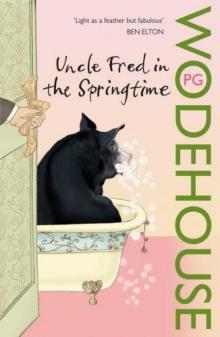 Uncle Fred in the Springtime
Uncle Fred in the Springtime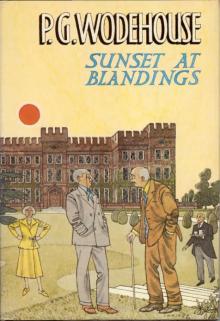 Sunset at Blandings
Sunset at Blandings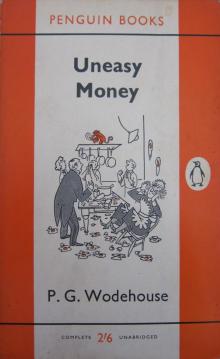 Uneasy Money
Uneasy Money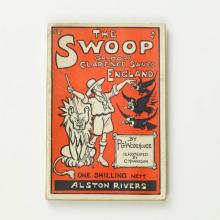 The Swoop! or, How Clarence Saved England: A Tale of the Great Invasion
The Swoop! or, How Clarence Saved England: A Tale of the Great Invasion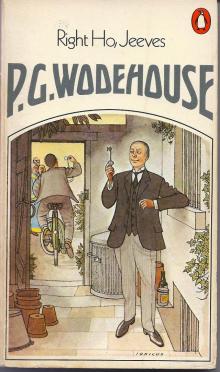 Right Ho, Jeeves
Right Ho, Jeeves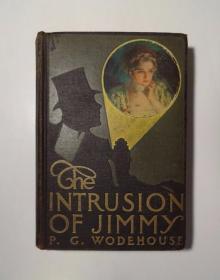 The Intrusion of Jimmy
The Intrusion of Jimmy The Jeeves Omnibus - Vol 1:
The Jeeves Omnibus - Vol 1: Aunts Aren't Gentlemen:
Aunts Aren't Gentlemen: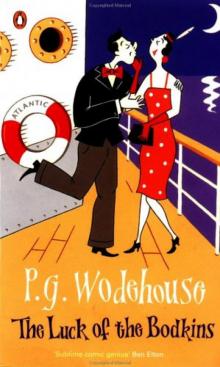 The Luck of the Bodkins
The Luck of the Bodkins The Little Nugget
The Little Nugget Money for Nothing
Money for Nothing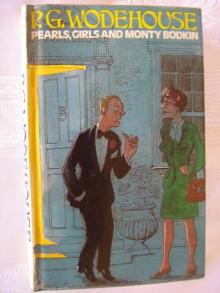 Pearls, Girls and Monty Bodkin
Pearls, Girls and Monty Bodkin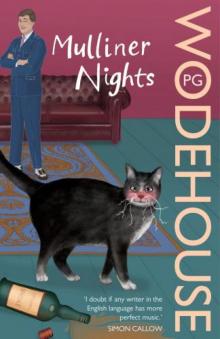 Mulliner Nights
Mulliner Nights Blandings Castle and Elsewhere
Blandings Castle and Elsewhere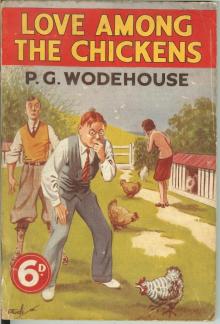 Love Among the Chickens
Love Among the Chickens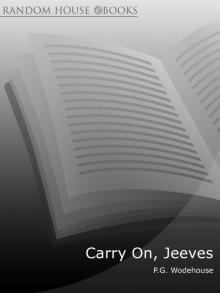 Carry On, Jeeves!
Carry On, Jeeves!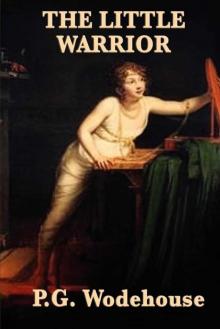 The Little Warrior
The Little Warrior Ice in the Bedroom
Ice in the Bedroom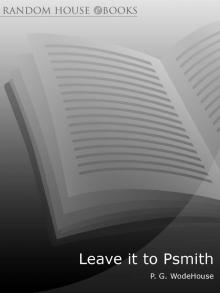 Leave It to Psmith
Leave It to Psmith Thank You, Jeeves:
Thank You, Jeeves: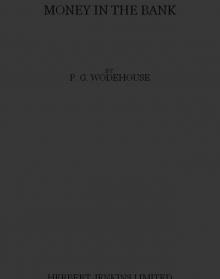 Money in the Bank
Money in the Bank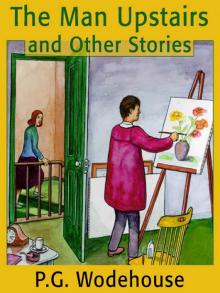 The Man Upstairs and Other Stories
The Man Upstairs and Other Stories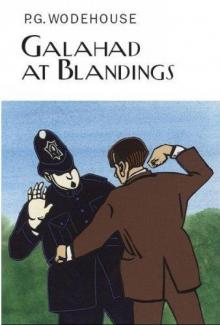 Galahad at Blandings
Galahad at Blandings The Jeeves Omnibus Vol. 5
The Jeeves Omnibus Vol. 5 Uncle Dynamite
Uncle Dynamite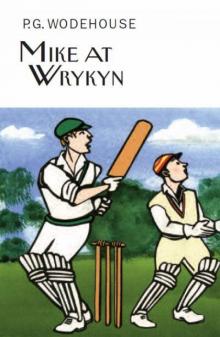 Mike at Wrykyn
Mike at Wrykyn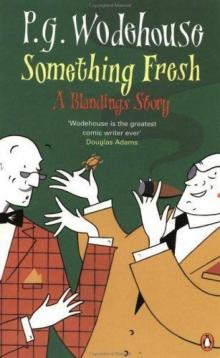 Something Fresh
Something Fresh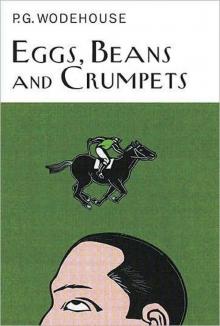 Eggs, Beans and Crumpets
Eggs, Beans and Crumpets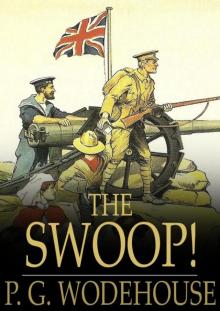 The Swoop: How Clarence Saved England (Forgotten Books)
The Swoop: How Clarence Saved England (Forgotten Books)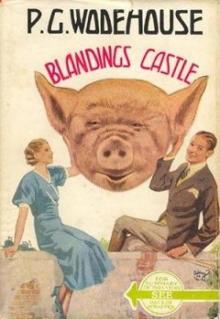 Blanding Castle Omnibus
Blanding Castle Omnibus Wodehouse at the Wicket: A Cricketing Anthology
Wodehouse at the Wicket: A Cricketing Anthology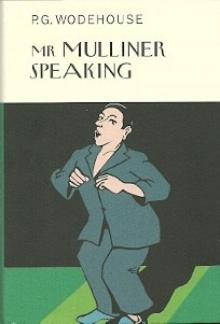 Mr. Mulliner Speaking
Mr. Mulliner Speaking Hot Water
Hot Water The Jeeves Omnibus - Vol 3: The Mating Season / Ring for Jeeves / Very Good, Jeeves
The Jeeves Omnibus - Vol 3: The Mating Season / Ring for Jeeves / Very Good, Jeeves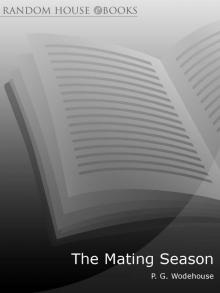 The Mating Season
The Mating Season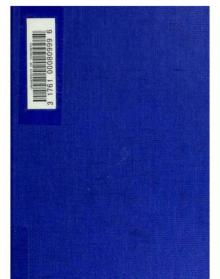 Meet Mr. Mulliner
Meet Mr. Mulliner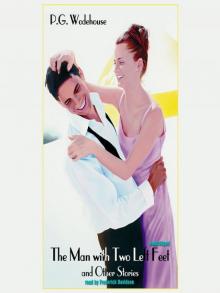 The Man with Two Left Feet, and Other Stories
The Man with Two Left Feet, and Other Stories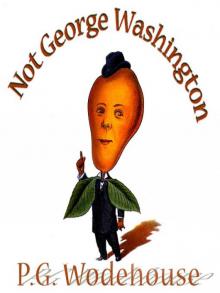 Not George Washington — an Autobiographical Novel
Not George Washington — an Autobiographical Novel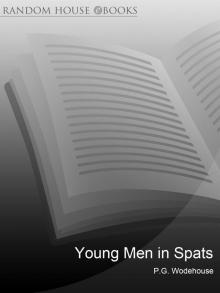 Young Men in Spats
Young Men in Spats The Jeeves Omnibus Vol. 4
The Jeeves Omnibus Vol. 4 A Pelican at Blandings:
A Pelican at Blandings: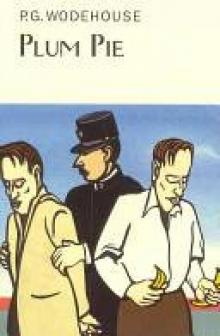 Plum Pie
Plum Pie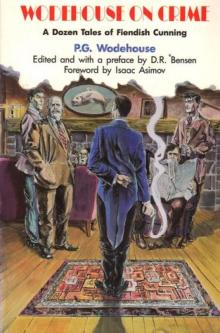 Wodehouse On Crime
Wodehouse On Crime The Jeeves Omnibus Vol. 2: Right Ho, Jeeves / Joy in the Morning / Carry On, Jeeves
The Jeeves Omnibus Vol. 2: Right Ho, Jeeves / Joy in the Morning / Carry On, Jeeves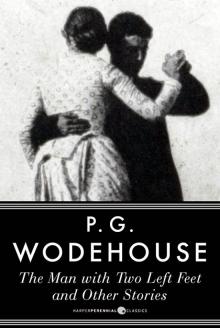 The Man With Two Left Feet
The Man With Two Left Feet Full Moon:
Full Moon: Jeeves and the Feudal Spirit:
Jeeves and the Feudal Spirit: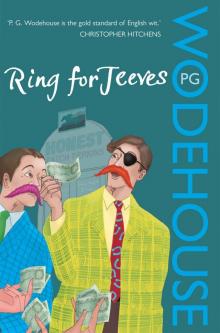 Ring For Jeeves
Ring For Jeeves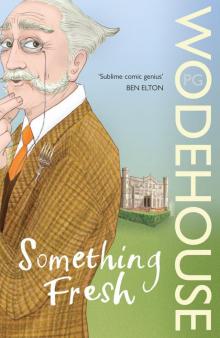 Something New
Something New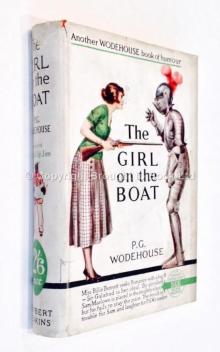 The Girl on the Boat
The Girl on the Boat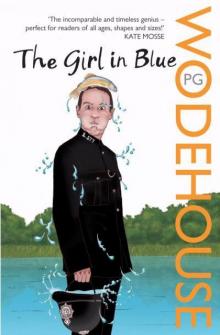 The Girl in Blue
The Girl in Blue Pigs Have Wings:
Pigs Have Wings: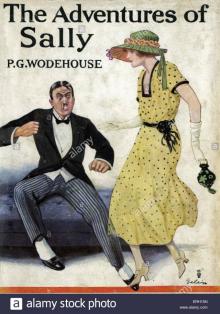 The Adventures of Sally
The Adventures of Sally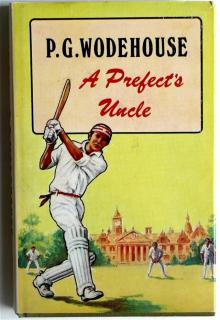 A Prefect's Uncle
A Prefect's Uncle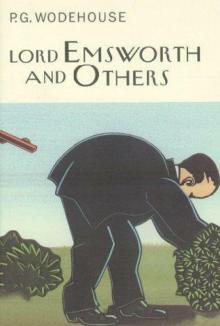 Lord Emsworth and Others
Lord Emsworth and Others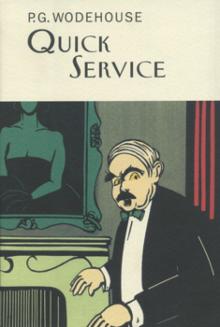 Quick Service
Quick Service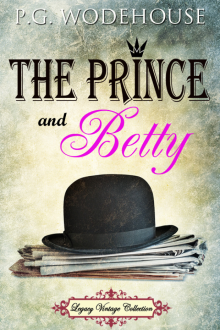 The Prince and Betty
The Prince and Betty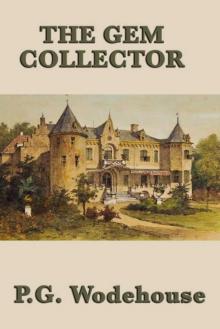 The Gem Collector
The Gem Collector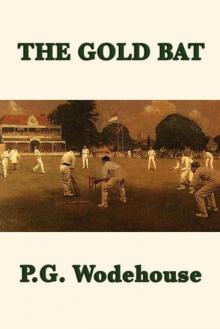 The Gold Bat
The Gold Bat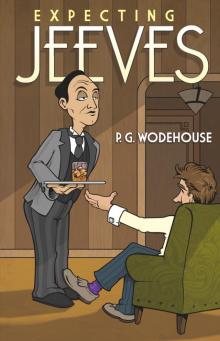 Expecting Jeeves
Expecting Jeeves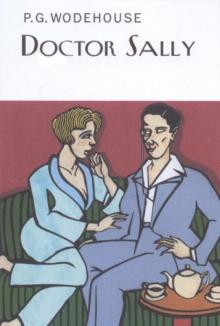 Doctor Sally
Doctor Sally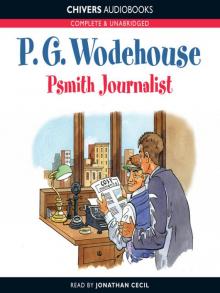 Psmith, Journalist
Psmith, Journalist The Golf Omnibus
The Golf Omnibus Heavy Weather
Heavy Weather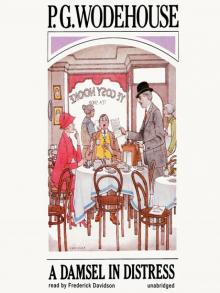 A Damsel in Distress
A Damsel in Distress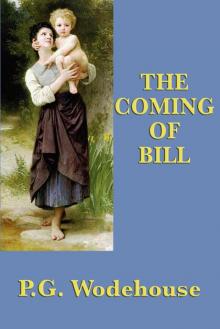 The Coming of Bill
The Coming of Bill Summer Lightning
Summer Lightning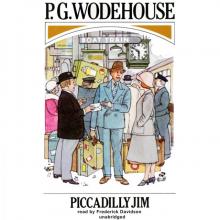 Piccadilly Jim
Piccadilly Jim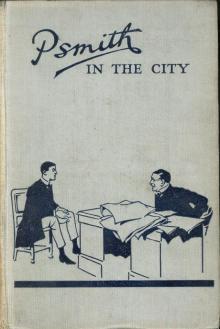 Psmith in the City
Psmith in the City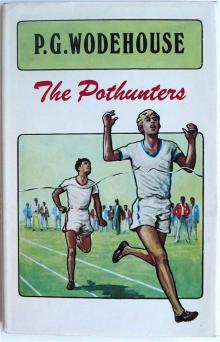 The Pothunters
The Pothunters Service With a Smile
Service With a Smile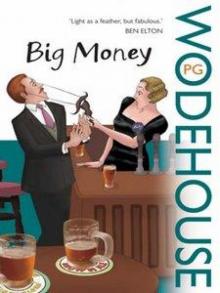 Big Money
Big Money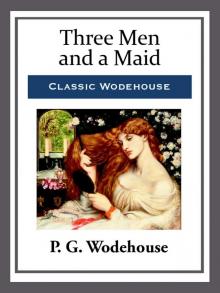 Three Men and a Maid
Three Men and a Maid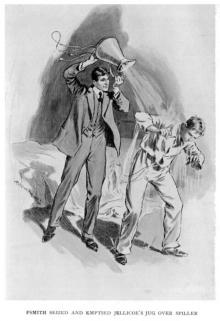 Mike and Psmith
Mike and Psmith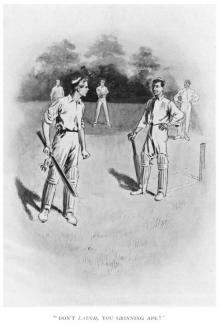 Mike
Mike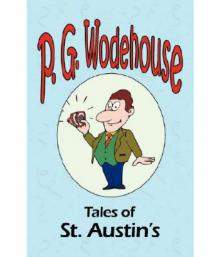 Tales of St. Austin's
Tales of St. Austin's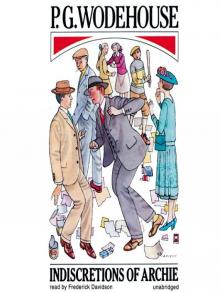 Indiscretions of Archie
Indiscretions of Archie Pigs Have Wings
Pigs Have Wings The Jeeves Omnibus - Vol 4: (Jeeves & Wooster): No.4
The Jeeves Omnibus - Vol 4: (Jeeves & Wooster): No.4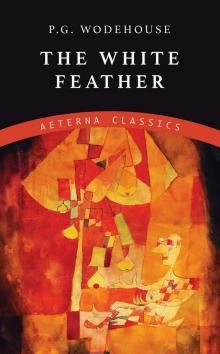 The White Feather
The White Feather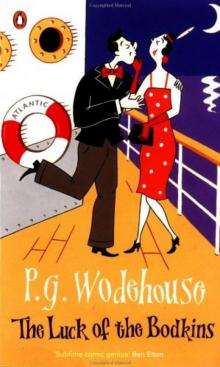 Luck of the Bodkins
Luck of the Bodkins THE SPRING SUIT
THE SPRING SUIT Full Moon
Full Moon Very Good, Jeeves
Very Good, Jeeves Thank You, Jeeves
Thank You, Jeeves Reginald's Record Knock.
Reginald's Record Knock. Wodehouse At the Wicket
Wodehouse At the Wicket LADIES AND GENTLEMEN V. PLAYERS
LADIES AND GENTLEMEN V. PLAYERS The Jeeves Omnibus - Vol 5: (Jeeves & Wooster)
The Jeeves Omnibus - Vol 5: (Jeeves & Wooster) The Jeeves Omnibus - Vol 1: (Jeeves & Wooster): No.1
The Jeeves Omnibus - Vol 1: (Jeeves & Wooster): No.1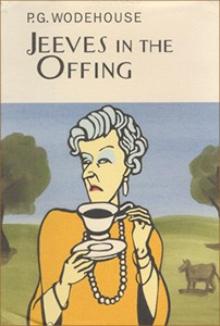 Jeeves in the offing jaw-12
Jeeves in the offing jaw-12